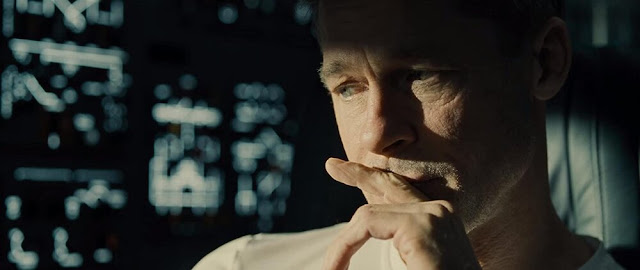 |
| Brad Pitt in Ad Astra |
It's said that there are really only two types of sci-fi movies: space Westerns and mind-bogglers. The Star Wars canon would be the archetype of the former, Stanley Kubrick's 2001: A Space Odyssey (1968) of the latter. But James Gray seems to want to bridge the types in Ad Astra, with some exciting action sequences in the first half of the film, including a spectacular fall by the protagonist, Roy McBride (Brad Pitt), from a space station near enough to the Earth for him to be affected by gravity, and an exciting chase sequence involving moon pirates. But then the film shifts into something more mythic, a father-son fable with overtones of Oedipus and Laius, Daedalus and Icarus, Orestes and Agamemnon, Abraham and Isaac, and so on. It goes from action to introspection so suddenly that it lost a lot of its audience, who may have gone in expecting something like Armageddon (Michael Bay, 1998) and found themselves watching something more like Terrence Malick's The Tree of Life (2011), and not just because Pitt sometimes seems to be reprising his character from the Malick film. Gray also makes nods to the Kubrick classic, with some wry twists: In 2001, for example, space flight has been commercialized, so that people travel to the moon on Pan Am (an airline that went out of business before the real 2001 rolled around). In Ad Astra, the moon flight is on Virgin, and Gray slips in a dig at today's commercial aviation when Roy requests a blanket and pillow and is told that the charge for them is $125. Earthlike crime and corruption have also infected travel in space: Not only are there pirates on the moon, the international competition for mineral rights has bred distrust. The American program has been militarized, with the usual consequences of rank-pulling and official secrecy screwing things up. Pitt carries the film as he has never carried one before, having developed a gift for revealing the internal torment carefully masked by external stoicism. I have a feeling that Ad Astra, though reckoned a bit of a box office disappointment at the time, is going to grow in stature over the years, along with Gray's reputation as a director.